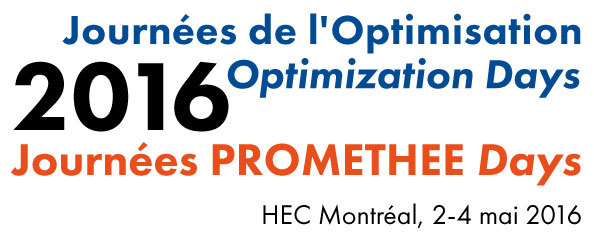
Journées de l'optimisation 2016
HEC Montréal, Québec, Canada, 2 — 4 mai 2016

MB6 Pricing in Finance
2 mai 2016 15h30 – 17h10
Salle: CPA du Québec
Présidée par Yaovi Gassesse Siliadin
4 présentations
-
 15h30 - 15h55
15h30 - 15h55Merton’s financial consumption and strategic pricing
Kernel consumption pricing models based on the CCAPM are defined with respect to a filtration, a risk free rate and a probability measure, by (for example, Lucas, 1978, Constantinidis and Duffie, 1996, Cochrane 2001 as well as an extensive list of research papers and books). The purpose of this paper is to consider a financial Consumption pricing approach based on the financial expenditure needed to finance a consumer’s consumption. Instead, of maximizing the utility of a consumer we maximize his financial investment in consumption while the consumption price is the outcome the aggregate demand for consumption and supply factors. Such a framework leads to a strategic (multi-agent) Merton pricing model which we consider in its stochastic-time continuous version (see Tapiero, 2014 for a two periods discrete time Merton Model). Examples to such problems abound, including, energy markets for oil, gas as well as food markets (soya, orange juice, etc.) traded globally and supplied globally either by few suppliers or by many and competing suppliers. For simplicity, a number of specific problems are solved and the implication of such problems to returns and assets pricing are considered.
-
 15h55 - 16h20
15h55 - 16h20A dynamic programming procedure for pricing American-style options under Variance Gamma process
Evidence from the financial markets suggests that stock returns do not arise from diffusion processes. To capture the market stylised features, a growing literature propose the use of infinite-activity pure jump Lévy processes. In this setting, explicit solution for derivative prices are often unavailable, in particular the valuation of American options. We propose a dynamic programming coupled with finite elements for valuing American-style options under Variance Gamma model, and we provide a proof of uniform convergence. Our numerical experiments confirm this convergence result and show the efficiency of the proposed methodology.
-
 16h20 - 16h45
16h20 - 16h45Pricing callable bonds under the two-factor Vasicek model
This paper proposes a pricing approach for callable bonds in multifactor interest rate models. The pricing problem is posed in the form of a dynamic program. To solve the problem, the essay proposes a recursive algorithm based on the joint distribution of the factors under the forward measure, on truncated Chebyshev series and on Clenshaw-Curtis integration. A proof of convergence of the algorithm for any number of Gaussian factors is proposed. The approach is illustrated under the two-factor Vasicek model which is chosen for its parsimony. The impact of various parameters of the model such as the correlation between the two interest rate factors on the embedded call price is analyzed. The advantage of the proposed algorithm compared to alternative methods is the stability and the numerical accuracy that it offers in a reasonable computing time.
-
 16h45 - 17h10
16h45 - 17h10Pricing American-style interest-rate derivatives under affine jump-diffusions
In this paper, we propose a general framework for the pricing of American-style fixed-income derivatives under affine-jump-diffusion interest-rate models. The model, which combines Fourier transform (Duffie et al. 2000) and dynamic programming, is applied to the pricing of swaptions and bonds with early-exercise features, and investigated empirically under Vasicek with exponentially-distributed jumps.
